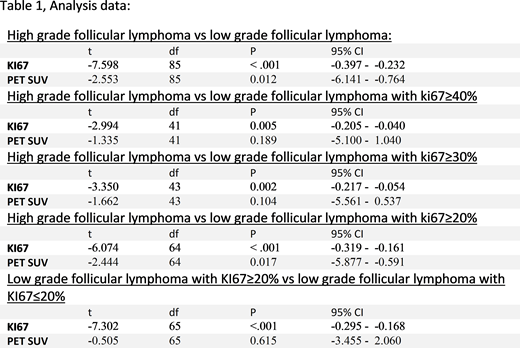Introduction: Low grade follicular lymphoma (LGFL) with high proliferation index (HPI) behave more like high grade follicular lymphoma (HGFL) and therefore, may require different therapeutic options. Currently they're only identified histologically.
We studied the PET scan observations of this subset of follicular lymphoma (FL) which occupy a clinical grey zone between LGFL and HGFL to determine whether these lymphomas can be distinguished based on PET scan SUV.
Methods: One hundred and twenty-four FL cases at the pathology department at Albany Medical Center between years 2013-2019 were collected. The grade, evaluated based upon the WHO criteria for grading of FL, and KI67 index were recorded. PET scan reports of these cases were reviewed. Cases with no PET scan report, or where the PET scan report did not match the date criteria or site of the biopsy (Bx) were excluded. Of the 87 cases that were included 67 cases were of low grade and 20 cases were of high grade. Among the low grade cases, 23 cases had a high proliferation index (KI67>40%).
53 cases were excisional Bx and 34 Core Bx. The male to female ratio was: 46:40, and the age ranged from 35-92 with a mean of 63.59.
Results: KI67 and SUV means were compared using an independent sample t test and the analysis (table 1) shows that although PET SUV may differentiate HGFL from LGFL, it does not differentiate HGFL from LGFL with HPI when using KI67≥40 % or KI67≥30% as cutoff points.
However, the statistical significance noted in SUV between HGFL and LGFL with HPI when using KI67≥20% as a cut off point, is probably due to the grade of lymphoma, given the loss of significance (p>0.05) when LGFL with KI67≥20% is compared to LGFL with KI67≤20%.
Conclusion: Our findings indicate that LGFL with HPI cannot be reliably identified on PET scan alone. Histology remains the gold standard for identifying low grade follicular lymphoma with high proliferation index.
No relevant conflicts of interest to declare.
Author notes
Asterisk with author names denotes non-ASH members.


This feature is available to Subscribers Only
Sign In or Create an Account Close Modal